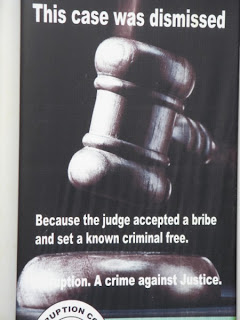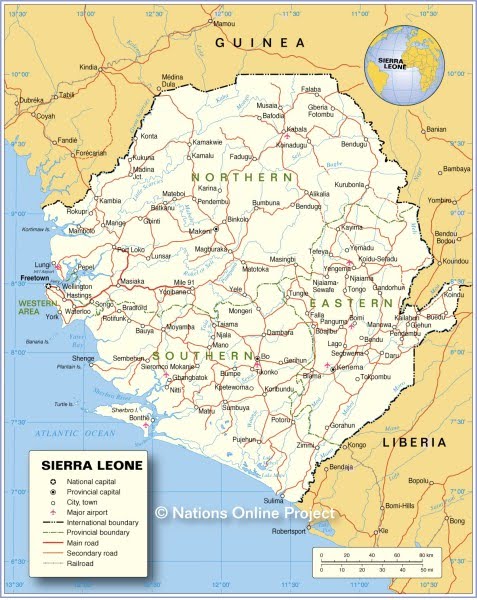 At the end of long, hot day, our car was well loaded with a mixture of colleagues and students. Despite the heat and the hour, the banter was flowing in Krio and English with laughter in both. We were approaching the time for examinations and tension around a number of issues emerged frequently and humour served as a release from the tensions. From a student who is also a senior school administrator we heard a story from a previous decade and of the malpractice of a teacher who ensured that students, who should not have been able to sit for an examination, found with a little payment that there was a place available on the day that mattered . Suddenly the flood gates opened on the stories of corruption... “Did you see that story on the 80 million Leones that has gone missing from the Anti Corruption Commission?” The carload laughed in chorus and further corruption anecdotes flowed faster than the traffic. 80 million Leones is £120,000, a huge sum of money in a country where the largest denomination 10,000 Leones, is only the equivalent of 2US$, a day’s pay for a 12 hour shift on building site.
At the end of long, hot day, our car was well loaded with a mixture of colleagues and students. Despite the heat and the hour, the banter was flowing in Krio and English with laughter in both. We were approaching the time for examinations and tension around a number of issues emerged frequently and humour served as a release from the tensions. From a student who is also a senior school administrator we heard a story from a previous decade and of the malpractice of a teacher who ensured that students, who should not have been able to sit for an examination, found with a little payment that there was a place available on the day that mattered . Suddenly the flood gates opened on the stories of corruption... “Did you see that story on the 80 million Leones that has gone missing from the Anti Corruption Commission?” The carload laughed in chorus and further corruption anecdotes flowed faster than the traffic. 80 million Leones is £120,000, a huge sum of money in a country where the largest denomination 10,000 Leones, is only the equivalent of 2US$, a day’s pay for a 12 hour shift on building site. 

The correlation between income per capita and corruption generally indicates that those nations with the lowest levels of economic inequality perform higher in the international transparency league and demonstrate a lower level of corruption. Recently the BBC world service has chosen to explore the existence of corruption by highlighting two countries at opposite ends of the spectrum, Sweden and Somalia. In doing so, they have highlighted another aspect of cause and effect, that of war and civil conflict. Sweden is nation without a history of war in the last 200 years whilst Somalia has been in civil and international turmoil for decades and where, currently, heavily armed African Union troops are desperately trying to establish government control of the capital Mogadishu.
Corruption in varying degrees is universal and the recent decision to award the 2018 World Cup to Russia has captivated the attention of those who seek to establish transparent good governance in all aspect of life, including in football. By definition corruption is a secretive transaction and as such is difficult if not impossible to measure accurately but this does not prevent attempts being made to determine the consequences of it. In this respect civic education on the end product of corrupt practices seems more beneficial than trying to offer definitions of what it is and is not. In Freetown the roadside publicity seeks to inform the public of what public services are not being delivered as a result of corruption and as such it seeks to promote accountability for individual decisions.
 Across the continent corruption is seen as a pervasive problem that creates barriers to development. Transparency International’s (TI) 2010 Corruption Perceptions Index (CPI), released in October 2010, identified Africa as the most corrupt region in the world and Sub-Saharan Africa as one of the most under-developed regions on earth. Whilst Sweden is ranked number 4, of the 178 countries surveyed, Somalia occupies the lowest position. Unfortunately six African nations rank among the 10 most corrupt countries surveyed. As Sierra Leone is ranked 134, anti corruption education and strategies is vital, nevertheless, the costs of providing such is an expenditureis an added financial burden upon the nation.
Across the continent corruption is seen as a pervasive problem that creates barriers to development. Transparency International’s (TI) 2010 Corruption Perceptions Index (CPI), released in October 2010, identified Africa as the most corrupt region in the world and Sub-Saharan Africa as one of the most under-developed regions on earth. Whilst Sweden is ranked number 4, of the 178 countries surveyed, Somalia occupies the lowest position. Unfortunately six African nations rank among the 10 most corrupt countries surveyed. As Sierra Leone is ranked 134, anti corruption education and strategies is vital, nevertheless, the costs of providing such is an expenditureis an added financial burden upon the nation.
 Being able to afford the funds needed for Krisi Mas is a very high individual priority. The arrival of Christmas is welcomed by Muslims and Christian alike with regular talk of ‘my Krisi Mas’, meaning a personal gift. City life
Being able to afford the funds needed for Krisi Mas is a very high individual priority. The arrival of Christmas is welcomed by Muslims and Christian alike with regular talk of ‘my Krisi Mas’, meaning a personal gift. City life
 Whilst friends and family in Europe are reporting their underfoot struggles with an early arrival of an excess of snow, the return of a cobra, apparently of the spitting variety, to the area around our house, has increased the need for us to watch our step and tread carefully through the vegetation. A cobra of any size is taken very seriously and the one that we are sighting is of considerable length so that the spraying of a little diesel fuel to the surroundings and the cutting back of some of the bush, are the recommended ways to indicate that it is not welcome.
Whilst friends and family in Europe are reporting their underfoot struggles with an early arrival of an excess of snow, the return of a cobra, apparently of the spitting variety, to the area around our house, has increased the need for us to watch our step and tread carefully through the vegetation. A cobra of any size is taken very seriously and the one that we are sighting is of considerable length so that the spraying of a little diesel fuel to the surroundings and the cutting back of some of the bush, are the recommended ways to indicate that it is not welcome.
If Janice’s English class were to be asked to give words to describe snakes, many of the words would be similar in meaning to those used to describe individuals who choose to deal dishonestly. However, she would gently remind them of the positive symbolism of the snake on the pharmacy signs around the city. Snakes are also a symbol of health, and wholeness, and this is what we celebrate as the season of Christmas draws closer. With maternal health mortality at such a high level in Sierra Leone, that Amnesty International described it as a violation of a human right, posters around the town that indicate corruption as a cause of poor health care are very pertinent. The good news is that there has been significant improvement in maternal care provision in the last 6 months. However there are still far too many Salonean mothers, who are like Mary, giving birth to a baby in the isolation of the bush, on the road hoping to get to the nearest clinic, or in the most humble of surroundings should they manage to get there, and yet each birth will be honoured as yet another blessing from God.
Snakes are also a symbol of health, and wholeness, and this is what we celebrate as the season of Christmas draws closer. With maternal health mortality at such a high level in Sierra Leone, that Amnesty International described it as a violation of a human right, posters around the town that indicate corruption as a cause of poor health care are very pertinent. The good news is that there has been significant improvement in maternal care provision in the last 6 months. However there are still far too many Salonean mothers, who are like Mary, giving birth to a baby in the isolation of the bush, on the road hoping to get to the nearest clinic, or in the most humble of surroundings should they manage to get there, and yet each birth will be honoured as yet another blessing from God.
May your season of Christmas be a time of blessing too.

No comments:
Post a Comment